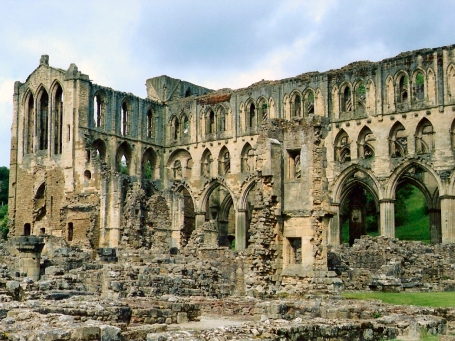
Fountains Abbey was established by thirteen Benedictine monks of St. Mary's Abbey, York. Wishing to observe a more strict discipline, they obtained a grant of land near Ripon from the Archbishop of York. Richard, the prior of St. Mary's, was the leader of the party. They left St. Mary's in October 1132, reaching Fountains near the end of December and immediately placed themselves under the authority of St. Bernard, who sent Geoffrey of Clairvaux to teach them the Cistercian Rule.
After two years of deprivation and poverty they decided to leave England and seek a home among their brethren in France. This became unnecessary when Hugh, Dean of York, joined them, bringing money and property with him. He was followed by two canons of York – Serlo and Tosti – who brought still more funds and supplies. The community was relieved of their impoverishment and suffering by these arrivals, enabling them to carry on the new foundation. Construction was completed before the year 1250.
A period of over 100 years of prosperity was followed by one of increasing difficulty, caused by the constant inroads of the Scots during the war of independence. On account of this, Edward II exempted the monks from all taxation in 1319.
Most of this 12th century Cistercian abbey ruin stands on the north bank of the River Skell, but the lay brothers' refectory stretches across the water to the south bank like a small bridge. A long narrow nave with arched aisles leads to the roofless Chapel of the Nine Altars, which has slender pillars and graceful arches. The abbey with its guest houses and offices originally stood in an enclosure of twelve acres; the present ruins occupy two acres.
View more photographs of Fountains Abbey at Travels in the UK, a travelogue by the Webmaster: Fountains Abbey Photo Gallery.

A monastery is a building or complex of buildings comprising the domestic quarters and workplaces of monastics, monks or nuns ...Read more at Wikipedia.

Cathedrals, as well as many abbey churches and basilicas, have certain complex structural forms that are found less often in parish churches. Read more at Wikipedia.